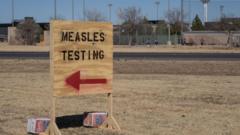A recent US government report on children's health has come under fire for including citations of non-existent studies. Academics listed as authors have denied their involvement, sparking concerns about the accuracy of the report amidst a broader discussion on public health policy.
Fabricated Citations in US Health Report Spark Controversy

Fabricated Citations in US Health Report Spark Controversy
Academics dispute the credibility of a US government report attributing children's health issues to studies that do not exist.
A US government report focusing on children's health has been criticized for citing "totally fabricated" studies, as indicated by the academics incorrectly attributed as authors of those works. Originally published on May 22, the report aimed to identify causes behind what it labeled a "chronic disease crisis" affecting American children. However, an amended version was released on May 29 following the discovery by digital news outlet NOTUS that seven sources cited in the report did not exist.
In response to the allegations, White House Press Secretary Karoline Leavitt acknowledged "formatting issues" but asserted that these discrepancies did not detract from the report's core findings. The Department of Health and Human Services, led by US Health Secretary Robert F. Kennedy Jr., is charged with these controversial findings, including claims surrounding poor diet, environmental toxins, and insufficient physical activity as contributing factors to chronic illness in youth.
Notably, some of the named authors of the studies cited in the report have gone public to refute their alleged contributions. For instance, Guohua Li, a Columbia University professor, classified his named involvement in a report on children’s mental health during the pandemic as "totally fabricated," emphasizing he was unfamiliar with the co-author listed. This sentiment was echoed by Noah Kreski, a fellow researcher at Columbia, who stated the purported study "doesn't appear to exist at all."
Katherine Keyes, an epidemiology professor, expressed concern over the implications of such citation errors for academic rigor, noting that citation practices are crucial to credible scientific reporting. The controversy extended further, as a study relating to the marketing of psychotropic medications for youth included another instance of misattribution, according to the university of the claimed author.
Critics, including members of the Democratic National Committee, accused RFK Jr.'s department of "justifying its policy priorities with sources that do not exist" and highlighted an array of citation errors, from broken links to misrepresented findings. Since his arrival in February, RFK Jr. has initiated significant staffing cuts within the health department and has proposed yet another controversial measure: conducting placebo trials on all new vaccines. This ongoing dialogue illustrates the complex intersection of health policy and scientific integrity in the United States.




















